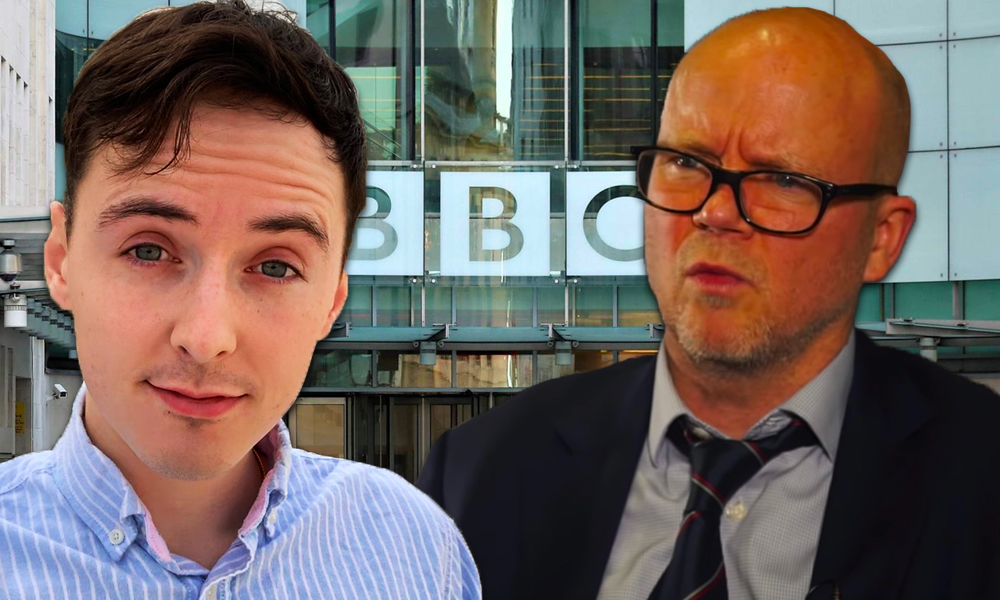Category: Broadcasters
-
Cummings and Cain Held Private Meeting With New BBC Boss on Day of Internal Market Bill Vote
Sam Bright reports on how the Prime Minister’s former top advisors met with Tim Davie on the day of a Brexit vote that threatened to break international law
-
Rupert Murdoch in Series of Meetings With Boris Johnson and High-Profile Ministers
The right-wing billionaire gained unprecedented access to ministers, reports Sam Bright
-
10 Reasons Why Paul Dacre is Unfit to Be the New Ofcom Chair
Brian Cathcart gives a personal view of why the former Daily Mail editor would be the worst thing to happen to the broadcasting regulator entrusted with upholding journalistic standards
-
Outflanking Murdoch from the Far-Right
While Fox News and other outlets have polarised Australia, the US and UK, CJ Werleman fears that an even ruder shock awaits us
-
‘Too Complacent’: BBC’s Finances in Crisis As New Threats Loom
The broadcaster is being forced to compete with new, commercial projects with an ever-declining income, reports David Hencke
-
Plastic Patriotism: GB News’ Foreign Funders
Andrew Neil’s Union-Jack-branded platform is backed by a range of foreign and right-wing interests, reports Sam Bright
-
False Equivalence is Killing the BBC – and It’s Killing Us, Too
As the national broadcaster continues to provide a platform for Coronavirus fringe science, Patrick Howse explores how its airing of opinions not evidence, and prioritisation of political – rather than health – reporters could be lethal during the COVID-19 crisis
-
LBC Radio Host Maajid Nawaz Bankrolled by US Republican Dark Money
Nafeez Ahmed reports on the background of the controversial broadcaster whose think tank has been funded by Pro-Donald Trump donors
-
New BBC Chairman has Donated Over £400,000 to the Conservative Party
The public service broadcaster’s new figurehead is a prolific Conservative Party donor, reports Sam Bright
-
The Truth of the Matter: How the BBC Can Save Itself
Patrick Howse reviews a new book about the forces raging against the BBC, and offers some solutions to the broadcaster’s current predicament
-
Murdoch: ‘Thug and Bully is Terminal Trouble for Democracies’, Says Former Australian Prime Minister
Speaking exclusively to the Byline Times Podcast, Kevin Rudd discusses his campaign to establish a Royal Commission into the need for media diversity in Australia
-
US ELECTION 2020: The Power of Populist Lies and the BBC’s Failure to Expose Them
The BBC’s coverage of the 2020 Presidential Election has further exposed its flawed quest for balance, argues Patrick Howse
-
After Dark: Are the Lights Going Out on Public Service Broadcasting?
Julian Petley looks at the people behind Andrew Neil’s new GB News and sees ominous signs both for the BBC and the principle of impartiality
-
Why Is Homophobia Still an Explicitly Acceptable Prejudice to Hold?
Strictly Come Dancing’s first same-sex pairing is not the milestone those praising the decision believe it to be, writes George Attwood
-
Owner of Andrew Neil’s GB News in Awkward Conflict of Interest
While the new television channel has pitched itself as a rival to the media establishment, one of its co-founders maintains ties to one of Britain’s big broadcasters
-
The Treachery of the Scribes
Peter Jukes explains how a warped form of journalism has taken control in the UK and talks to ITV News Political Editor Robert Peston about the limitations of the lobby system
-
UNCONSCIOUS EMPIRE: Saving ‘Britannia’ and Losing the Plot
Continuing to wage a Steve Bannon-style culture war, Boris Johnson’s Government will do nothing to confront the damaging legacy of our imperial past because its mythologised symbolism is all it has to sell to Brexit Britain, argues Hardeep Matharu
-
SWEENEY INVESTIGATES: What Changed to Make Evgeny Lebedev No Longer a Security Risk?
John Sweeney investigates the Russian newspaper proprietor who parties with the Prime Minister and the change in security clearance that enabled his ennoblement
-
The Hard Right is a Far Greater Threat to Freedom of Speech than ‘Cancel Culture’
Their reaction to the assault on left-wing commentator Owen Jones proves that many far-right-wing commentators secretly approve of silencing those who oppose them
-
BBC’s Great ‘Balancing’ Act Favours Noise Over Truth
Former BBC reporter and producer Patrick Howse explores what Any Questions’ decision to invite former Brexit MEP Claire Fox onto the show reveals about the corporation’s wider problems
-
Putin Sets his Sights on Pussy Riot Activist Ahead of Vote on 2036 Power Grab
Sarah Hurst reports on the targeting of Petr Verzilov and how the President is pulling out all the stops to ensure a 1 July vote on sweeping changes to the Russian Constitution goes in his favour
-
The Coronavirus Crisis: When Did the NHS Become a Charity?
To celebrate the first week of Yorkshire Bylines, a regional news site developed by YesWeWork using the Byline Times news template, Richard Sadler celebrates the formidable Captain Moore.
-
Herd Immunity – Timeline of a Climb-Down
Stefan Simanowitz recounts how counterclaim and backlash over a flawed Government policy wasted precious days in the UK’s fight against the Coronavirus.
-
The Herd Instinct and ‘Herd Immunity’: The Etiology of a Bad Idea
The science didn’t change – the politics did. Peter Jukes follows an inflammatory and disastrous theory as it spread rapidly through the British body politic.
-
The Coronavirus Crisis: Journalists Should Not Pick Sides
Brian Cathcart on why reporting that helps people form a balanced understanding of the Coronavirus outbreak so that they can make up their own minds in an informed way is absolutely vital.
-
‘Real Boot on the Throat Stuff’: Why the BBC is Facing the Fight of its Life
Former BBC producer Patrick Howse speaks to those inside the Corporation about the threats facing it at the hands of Boris Johnson and Dominic Cummings.
-
Like the NHS, the BBC is a National Treasure – We lose It At Our Peril
James Melville on why we must be careful what we wish for when it comes to making sweeping changes to the under-attack BBC.
-
The Worst of the Worst: John Whittingdale’s Return as a Media Minister
Why the Conservative MP’s return to the Department for Digital, Culture, Media and Sport is a bad sign for decent journalism in this country.
-
Whittingdale Returns: Who Remains to Ride to the Rescue of the BBC?
Former Labour MP and Digital, Culture, Media and Sport (DCMS) committee member Ian Lucas considers what John Whittingdale’s return to the department as a minister spells for the future of the public service broadcaster.
-
Three Cheers for Downing Street’s Attempts to Muzzle the Press
Fleet Street Veteran Liz Gerard Congratulates Boris Johnson’s Communications Director for Finally Exposing the Truth about the Lobby System.
-
This General Election Exposes how our Nation was Failed
On the eve of the most important election in a generation, Otto English asks: will Britain – failed by so much – survive the coming trauma?
-
BBC Denies Breaking Electoral Law over Postal Votes
In another basic error from the public service broadcaster, its political editor breaks the strict secrecy of the postal ballot.
-
The Lopsided Centre: Why is the Media’s Unbalanced Scrutiny Giving the Tories a Free Ride?
Musa Okwonga examines why the myth of the Conservative Party’s competence persists and how those meant to be holding Boris Johnson to account are complicit in its belief.
-
John Sweeney: ‘BBC hasn’t Told Truth to Power and Tony Hall Should Resign’
Veteran investigative journalist joins a growing chorus of criticism of the public service broadcaster.
-
The BBC is Disseminating Misinformation in its Quest to ‘Reflect Modern Britain’
Former BBC newsreader Jake Lynch on why the corporation is proving so feeble in exposing lies told by politicians.






































